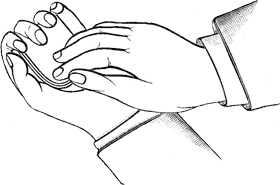
|
foreword to the online edition I. introductory II. common sharpers and their tricks III. marked cards and the manner of their employment IV. reflectors V. holdouts VI. manipulation VIII. the game of faro IX. prepared cards X. dice XI. high ball poker XII. roulette and allied games XIII. sporting houses XIV. sharps and flats
|
SHARPS AND FLATS
CHAPTER V HOLDOUTS
Closing Thoughts on Holdout MachinesBy this time the reader will be in a position to understand the nature of the 'reflector on machine,' referred to in the last chapter, without needing to be wearied with further details of this particular kind. Having thus glanced at all the principal varieties of the modern holdout, with one or two of the more ancient ones, it only remains to add a few general remarks to what has been said. Each class of machine has its own peculiar advantages and disadvantages. Each sharp has his own peculiarities of taste and his own methods of working. Therefore, there is no one kind of appliance which appeals equally to all individuals. Some will prefer one machine; some another. That, of course, is the rule in the world generally. A great deal also depends upon the manners and customs of the country in which the machine is to be used. For instance, how many card-players are there in England who hold their cards in the manner represented in fig. 34? Very few, I take it. Yet it is a very good method of preventing others from seeing one's hand. Further, it is the correct way to hold the cards when using the Kepplinger sleeve-machine. The cards are placed flat in one hand, the ringers of the other are pressed upon them in the centre, whilst the thumb turns up one corner to allow of the indices being read. To adopt this method in England, however, would be to arouse suspicion at once, merely because it is unusual. Therefore the vest machine is the best for the English sharp; although no holdout can compare with the Kepplinger in a game of Poker in America. FIG. 34 -- Poker player's method of holding cards Although most of these contrivances are simple in operation, the reader must not run away with the idea that their use entails no skill upon the part of the sharp who uses them. That would be far too blissful a state of affairs ever to be achieved in this weary world, where all is vanity and vexation of spirit. Certainly, they do not demand the dismal hours of solitary confinement with hard labor which have to be spent upon some of the manipulative devices and sleight-of-hand dodges; but still they require a certain amount of deftness, which can only be acquired by practice. The following instructions will represent the advice of an expert, given to a novice who proposed to try his hand with a machine at the game of Poker:
Having digested these words of comfort and advice precious jewels extracted from the crown of wisdom and experience we may proceed on our way invigorated and refreshed by the consciousness of having acquired knowledge such as rarely falls to the lot of man to possess.
|
| « holdouts (the table holdout) | manipulation » |
home | introduction | book content | links | advertising | contact
